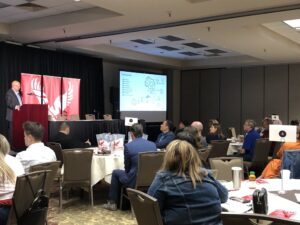Five cybersecurity and artificial intelligence professionals from various fields gave a sneak peek into the future of threats and opportunities of machine learning during their keynote speeches during a recent Eastern Edge event hosted by Eastern Washington University.
The event, held July 22 at the DoubleTree Suites by Hilton Hotel Seattle Airport – Southcenter, drew a crowd of nearly 100 attendees from the greater Seattle Area. The discussion was led by Stu Steiner, assistant professor of computer science and director of the award-winning cybersecurity program at EWU.
The forum compared the differences between humans and artificial intelligence (AI). For instance, AI can process and analyze vast and numerous amounts of data and perform much faster analysis for potential threats or attacks than humans alone. As a result, any team or company without this emerging technology has a large disadvantage – giving those with the AI and machine learning (ML) a leg up over their competitors. (You can access the full video of the Eastern Edge forum online.)

“What we are seeing here is a change in the way we interact with it (AI),” said Jason Elrod, vice president and chief information security officer for MultiCare. Elrod went on to say that our society has removed the need to have the talent necessary to interpret AI by giving access to these capabilities to anyone with a computer.
Although that access has opened doors for companies, education, healthcare and federal entities to automate with ease, it also allows for greater vulnerabilities in the form of cyber threats on a scale of which many may not be ready to handle.
Maryanne Cantwell, cyber operations analyst, U.S. Army Cyber Command, said the likelihood of federal network infiltration attempts today is almost certain.
“This makes cybersecurity the most critical and, unfortunately, weakest domain for national security. The integration of AI will only widen the scope of these existing vulnerabilities,” said Cantwell adding that the only way to combat these increased and sophisticated threats is by utilizing the AI technology for defense as well.

Steve Hobbs, Washington Secretary of State, talked about the importance of elections to democracies. His team of eight cybersecurity experts work to maintain integrity in our elections – including the fight to track down deep fakes and other misinformation before it reaches voters.
Hobbs added that the advent of AI can increase the effectiveness of disinformation campaigns, saying “Even in the smallest election, the ripple effect is pretty big.”
Thank you to these Eastern Edge experts for volunteering their time to share their knowledge:
The Honorable Steve Hobbs, Washington Secretary of State, addressed cyber and other threats to the Washington election systems and what is being done to enhance cybersecurity and fight disinformation.
Scott Ward, principal solutions architect – external security services, Amazon Web Services, outlined how Amazon is providing native cloud security services to customers and how AI/ML is being used to add value to those services.
Jason Elrod, vice president and chief information security officer, MultiCare, discussed emerging technology and new systems have required healthcare information systems and technology professionals to constantly evolve their approach to managing these exciting advancements.
Maryanne C. Cantwell, cyber operations analyst, U.S. Army Cyber Command, addressed the emerging realities of AI weaponization, as well as the challenges of AI integration into U.S. defense operations.
Art Maria ’76, director-chief architect, AT&T Consulting, discussed the role of advanced communications technologies that support 5G networks and safeguards against the possibility of cyberattacks.
Thank you to the following companies for sponsoring Eastern Edge:
- Presenting: WSECU
- Major: PEMCO
- Student Success: MultiCare
- Outreach Partner: New Tech Northwest